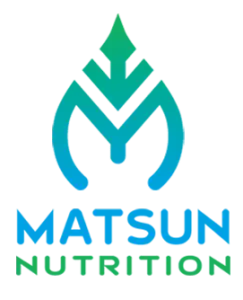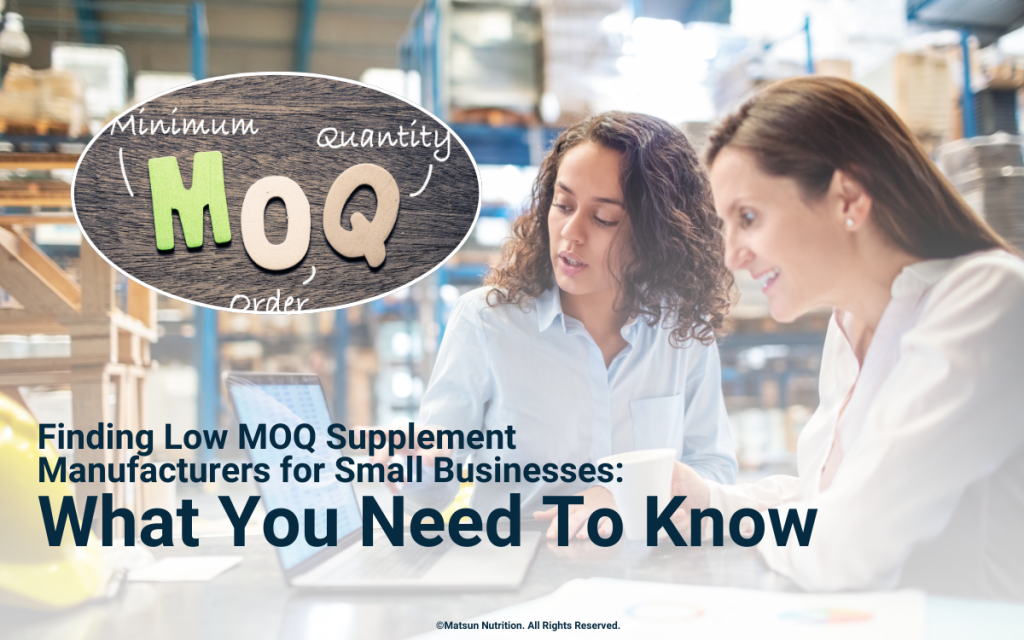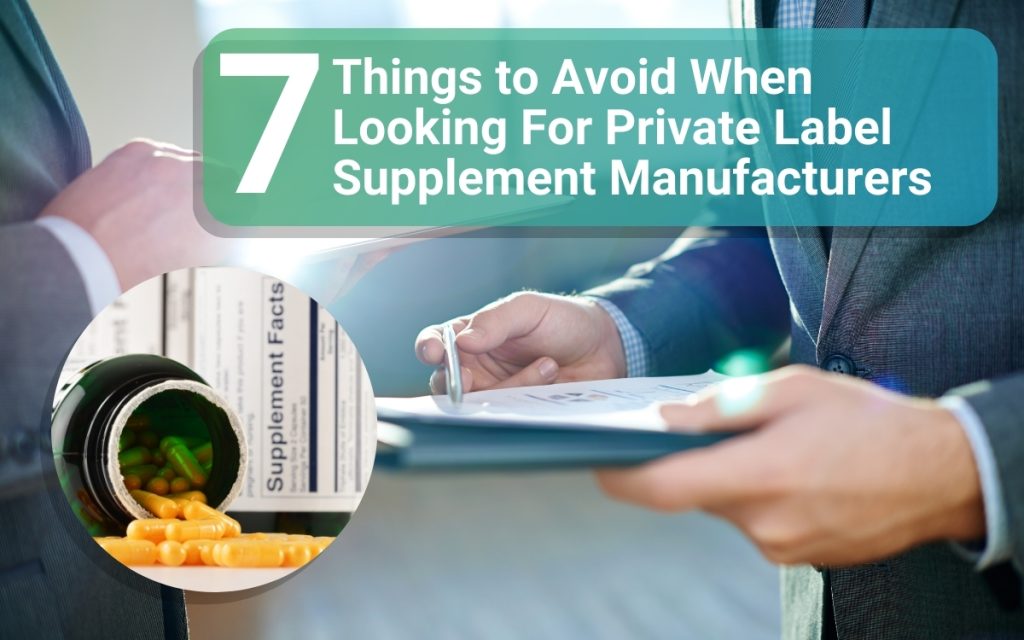Launching a new supplement brand can come with its fair share of challenges, such as sourcing high-quality ingredients for your brand. The ingredients you choose are crucial to your brand’s success as they directly impact your product’s effectiveness, safety, and brand reputation.
Here, we’ll help you navigate the complex world of ingredient sourcing. We’ll explore the key considerations you need to make when sourcing ingredients, how to choose the right ingredient suppliers, and how to build strong relationships with suppliers, ensuring you build a strong brand that stands out in the crowded marketplace.
Top Considerations for Ingredient Sourcing

The ingredients you select are the foundation of your brand’s success. As a result, it’s essential to select ingredients meticulously. That said, here are the essential factors you must consider when sourcing ingredients for your new supplement brand:
Quality and Safety

Ingredients are the building blocks of your supplements. Using high-quality ingredients ensures your supplements deliver the desired results without harming consumers. To guarantee the quality and safety of your ingredients, look for suppliers who can provide Certificates of Analysis (COAs) for each ingredient. These documents indicate the potency, purity, and absence of contaminants like pesticides, heavy metals, and pathogens in the raw materials.
And for additional quality assurance, consider third-party testing. Credible third-party labs can analyze your ingredients even further, ruling out the presence of any contaminants. This extra step can enable you to ascertain the safety of your ingredients and enhance consumer trust in your brand.
Traceability and Transparency

Nowadays, consumers are becoming increasingly interested in where their supplements come from. According to a study, over seven out of ten consumers stated traceability influenced their purchase decisions, and they would be willing to pay a premium for brands that explicitly state their ingredient source.
Reliable suppliers should be able to offer complete transparency about their sourcing, manufacturing processes, and quality control measures. Additionally, they should be willing to share their certifications, such as Good Manufacturing Practices (GMP), organic, or non-GMO certifications. Finally, they should allow you to schedule regular audits and visits to their facilities to vet adherence to quality control protocols and commitment to ethical sourcing practices.
Sustainability and Ethics

More consumers are becoming environmentally and socially conscious and actively seeking out brands that prioritize sustainability and ethical sourcing practices. According to a study, nearly four out of five American consumers said it’s important to adopt a sustainable lifestyle. This presents a valuable opportunity for your new supplement brand to stand out.
Look for suppliers who prioritize sustainable practices like using sustainable harvesting methods and renewable resources. Also, choose suppliers committed to ethical sourcing practices. Typically, suppliers committed to ethical sourcing have certifications like the Fairtrade, B Corp, or USDA organic certifications.
By choosing suppliers committed to sustainability and ethics, you will not only contribute to global conservation efforts and improved worker welfare but also attract a growing segment of consumers who want ethically produced products.
Regulatory Compliance

The supplements industry is heavily regulated. As a result, you must ensure your ingredients and final products comply with regulations. This includes adherence to GMP, labeling requirements, and safety standards provided by regulatory bodies like the Food and Drug Administration (FDA).
Familiarize yourself with the regulations in your target market to avoid costly recalls or legal issues. Working with suppliers with a proven regulatory compliance track record can streamline this process.
Innovation and Market Trends

Staying abreast of the latest supplement trends can give your brand a competitive edge. This entails not just keeping an eye on popular ingredients but also being aware of emerging research, novel production methods, and innovative custom formulations that can differentiate your brand.
Suppliers who prioritize research and development can be invaluable partners when it comes to keeping up with industry trends, as they can provide you with access to the latest ingredients and technologies to enhance your product offerings.
Cost and Value

Last but not least, you can’t ignore ingredient cost as it significantly influences your product’s final price. While it’s tempting to prioritize affordability, cost shouldn’t be the sole factor driving your sourcing decisions.
Opting for the cheapest ingredients can compromise the quality and effectiveness of your supplements, potentially damaging your brand’s reputation. So, focus on the value that each ingredient brings to your product. Also, negotiate reasonable prices with your suppliers and consider exploring long-term contracts for favorable pricing terms.
Investing in higher-quality ingredients can pay off in the long run as it can justify setting a premium price for your products, resulting in higher revenue from sales.
Choosing the Right Suppliers
Besides choosing the right ingredients for your supplement brand, it’s essential to partner with the right suppliers. That said, here are some key factors to consider when evaluating potential suppliers:
Customer Service
Responsive and reliable customer service is critical to a smooth relationship with your supplier. Partner with a supplier who uses your preferred communication channels and promptly responds to your questions and concerns.
Scalability
As your supplement brand grows, consumer demand for your products may spike. Partner with a supplier that can adapt to changing consumer demand and scale production as your product demand increases.
Minimum Order Quantities
Some suppliers have high minimum order quantities (MOQs), which can be unfeasible for new supplement brands. Ensure the supplier’s MOQs align with your production needs and future growth plans.
At Matsun Nutrition, we make it easy for new businesses to start selling supplements with MOQs as 12 bottles.
Pricing and Payment Plans
Don’t settle for the first supplier you encounter. Request for quotes from several suppliers to compare pricing. Then, once you find a suitable supplier, negotiate fair payment terms that fit your budget to maintain a healthy cash flow.
Cultivating Strong Supplier Relationships
Identifying reliable suppliers is an excellent first step toward getting high-grade ingredients. However, building strong relationships with suppliers is just as crucial. That said, here’s how to foster strong relationships with suppliers:
Maintain Open Communication
Open communication is vital to a strong partnership. Keep your suppliers informed about your inventory levels, demand forecasts, and upcoming promotions. This open communication can help them better support your needs and even give you first priority when there’s an ingredient shortage.
Additionally, practice proactive communication. If a problem arises, don’t hesitate to inform your suppliers. Doing so can ensure you resolve any issues promptly and prevent misunderstandings.
Exercise Fairness and Transparency
Negotiate contracts that are fair for both parties. Clearly outline expectations regarding quality, delivery times, and payment terms. By practicing fairness and transparency, you build trust and promote a collaborative relationship.
Appreciate Suppliers
Acknowledge the value your suppliers bring to your business. Whether via thank-you emails or social media appreciation posts, appreciating your suppliers can strengthen your relationship, resulting in long-lasting partnerships that fuel your brand’s growth.
Conclusion
Choosing the right ingredients is critical to your brand’s longevity and success. By prioritizing these key considerations when sourcing ingredients and partnering with suitable suppliers, you can set your products apart from the sea of other supplements on the market.
Ready to start offering consumers high-quality, effective, and safe supplements? Then, contact us to learn more about how we can get your brand off the ground.
Frequently Asked Questions (FAQs)
Beware of suppliers unwilling to provide Certificates of Analysis (COAs) or details about their quality control measures. Unresponsiveness or vague answers about certifications and sourcing practices can also be red flags. Additionally, if a supplier offers substantially lower prices than the market average, it might raise concerns about ingredient quality.
Request third-party certifications (such as organic, non-GMO, FairTrade) and conduct audits or visit their production facilities when possible. Asking for detailed documentation on their sourcing and manufacturing processes can also provide assurance.
Before settling for a supplier, inquire about their experience using any rare ingredients you're considering. Alternatively, contact a broker if you can't find a supplier with a unique ingredient you want to incorporate into your formula.
Brokers specialize in connecting buyers with potential suppliers. They have extensive industry knowledge and can help you navigate sourcing challenges, particularly for rare ingredients.
Before partnering with a supplier, inquire about the supplier's scaling capabilities. Ideally, you should choose a supplier who can scale production as your product demand rises.
If necessary, seek alternative suppliers who can meet your increased demand without compromising on quality. Building a diverse supplier network can mitigate risks associated with scaling.
Unfortunately, there's no one-size-fits-all answer for budgeting, as ingredient costs can vary based on the type, quality, and quantity you require. However, it's crucial to choose high-quality ingredients over poor-quality ones. Consider factors like minimum order quantities, supplier pricing structures, and potential fluctuations in ingredient prices due to changing market demand.



